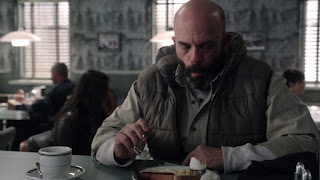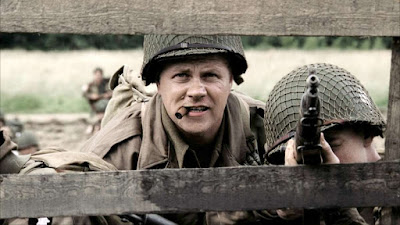 "BAND OF BROTHERS" (2001) - Episode Eight "The Last Patrol" Commentary
"BAND OF BROTHERS" (2001) - Episode Eight "The Last Patrol" Commentary
Episode Eight of
”BAND OF BROTHERS”,
”The Last Patrol” saw the return of paratrooper David Webster (Eion Bailey). Last seen in
"Crossroads", hobbling away from a battlefield in Holland, after being wounded; Webster returns from the hospital to find his old company recovering from the traumas suffered during the campaign in Belgium. With the Allies on the verge of victory, Easy Company begins to eye any chance of a return to combat with great wariness, during its stay in
Haguenau, a town located in the Alsace region. Unfortunately, their luck fails to hold when Winters orders Spiers to select a group of men to carry out a dangerous scouting mission within the German lines.
Recently, one of my relatives read an autobiography of one of the Easy Company veterans still living (I will not reveal his name). I was surprised to discover that he harbored some ill will toward the miniseries for allowing a major showcase of another character, David Webster. Why? Webster had never participated in the campaign in Belgium. He never bothered to leave the hospital to rejoin Easy Company in time for that harrowing experience. Many people might find that hard to believe. Yet, this autobiography had been recently published – perhaps in the last two years. This veteran continued harbor resentment toward Webster for missing the Belgium campaign after sixty odd years. Sixty years strikes me as a hell of a long time to be angry at someone for something like this.
Screenwriters Erik Bork and Bruce C. McKenna certainly included this resentment toward Webster in ”The Last Patrol”. In fact, I would probably say that they were a bit heavy-handed on this topic, especially in the episode’s first five to ten minutes. This was certainly apparent when Bork, McKenna and director Tony To insisted upon actor Eion Bailey wearing a silly grin on his face, when his character is informed about those Easy Company men that were killed, seriously wounded or otherwise in Belgium. The episode was also heavy-handed in its portrayal of Easy Company’s reluctance to engage in more combat, whether it was a major battle or a patrol. The first half of the episode seemed to saturate with some of the veterans either commenting on their reluctance to fight or their resentment toward newcomers like the recent West Point graduate, Second Lieutenant Jones (Colin Hanks) or returnees like Webster, who missed the Belgian campaign. And I never understood why Winters and not Spiers had chosen the fifteen men to partake in the patrol. Winters was the 2nd battalion’s executive officer around this time, not Easy Company’s commander.
Although the episode eventually improved, it still had another major flaw. The major flaw turned out to be Webster’s narration. Unlike Carwood Lipton’s narration featured in ”The Breaking Point”, Webster’s narration not only struck me as heavy-handed as the episode’s handling of his return, but also ineffective. The main problem with this episode’s narration is that it had a bad habit of repeating what was already shown. Some have blamed Eion Bailey’s performance for the flawed narration. However, I blame the screenwriters for writing it, and the producers for allowing it to remain in the episode. The material, in my opinion, seemed unworthy of a talented actor like Bailey.
Fortunately, ”The Last Patrol” was not a disaster. To, Bork and McKenna – along with most of the cast - did an excellent job of capturing the weariness suffered by Easy Company, following the ordeals of Bastogne and Foy; despite some of the heavy-handedness. This was especially apparent in Scott Grimes’ performance, whose portrayal of Sergeant Donald Malarkey seemed to reek of despair and grief over the deaths of “Skip” Muck and Alex Penkala in the last episode. The episode also benefitted from a humorous scene that centered on Frank Piconte’s (James Madio) return from hospital, after being wounded during the assault upon Foy. It allowed audiences to see how the men of Easy Company (both the Toccoa men and the replacements) had bonded – especially after the Belgium campaign. This scene provided a bittersweet moment for Webster (which was apparent on Bailey’s face), who began to realize how much his lack of experience in Belgium may have cost him. However, the episode’s centerpiece turned out to be the first rate action sequence that featured the patrol crossing the Rue de Triangle (Triangle River) and infiltrating German lines to snatch some prisoners. Although brief and filmed at night, the sequence was also fierce, brutal and a painful reminder that escaping the horrors of war might prove to be a bit difficult, despite the paratroopers and the Germans’ reluctance to engage in more combat.
Aside from Scott Grimes, other first-rate performances came from both Matthew Settle (Spiers) and Donnie Walhberg (Lipton), who seemed to have developed some kind of brotherly bond; Colin Hanks, who gave a nice, subtle performance as Easy Company’s newest addition, Lieutenant Henry Jones; Damian Lewis, whose finest moment as Winters came when the latter prevented the men from participating in a second patrol; Craig Heaney, whose portrayal of the embittered and caustic Roy Cobb seemed a lot more effective than in previous episodes; and Dexter Fletcher, who has been a favorite of mine for years. Not only was his portrayal of 1st Platoon sergeant John Martin was as deliciously sardonic as ever, but he provided a strong presence in the episode’s only combat sequence.
Although some are inclined to criticized Eion Bailey’s performance in ”The Last Patrol”, I am not inclined to do so. Yes, I was not impressed by his early scenes that featured Webster’s return to Easy Company. But I blame the screenwriters, not the actor. Thankfully, the episode moved past that awful beginning and Bailey proved he could give a subtle and well-rounded performance as the cynical Webster, who has to struggle to deal with the possibility that the men he had fought with in two major campaigns now consider him as an outsider.
”The Last Patrol” might not be one of the better episodes of ”BAND OF BROTHERS”. But for some reason, I have always liked it. I suspect that despite its flaws, I liked how the screenwriters and director Tony To gave it a world weary aura that matched both the situation and emotions that the men of Easy Company were experiencing, after eight months of combat.







.jpg)
































